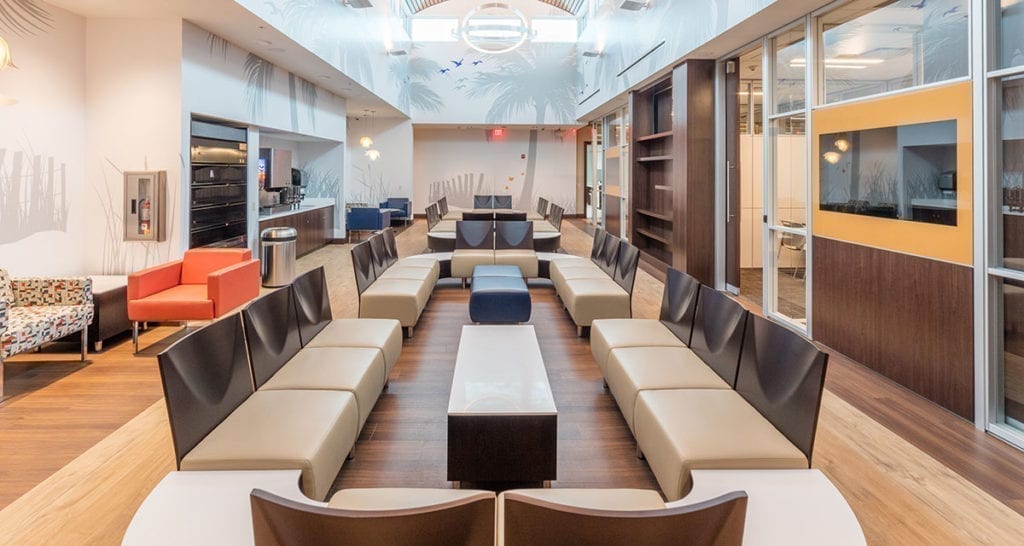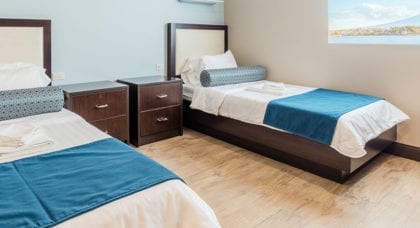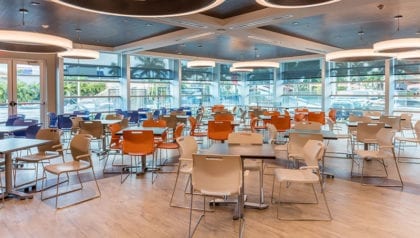According to a recent report from the Substance Abuse and Mental Health Services Administration, nearly 49 million people in the United States live with a substance use disorder. Residential treatment programs offer comprehensive care and support, helping individuals break the cycle of addiction, build healthy habits, and achieve long-term sobriety.

What Is Residential Treatment?
Residential treatment is one of the most important components of drug and alcohol rehabilitation. It features a comprehensive approach to addiction treatment in a state-of-the-art, campus-style mental health facility. Residents live in dorm-style rooms and participate in communal meals and recreational activities while receiving comprehensive therapy.
FHE Health’s residential drug rehabilitation program is equipped to treat a variety of addictions, including:
Benefits of Residential Inpatient Drug AddictionTreatment
Many people opt for inpatient rehab to begin their recovery journey. At this point, patients often need help with stabilization, managing their cravings, and exposure to drug or alcohol triggers. At FHE Health, we’ve designed a comprehensive residential drug rehabilitation program that helps patients build a strong foundation for lasting recovery.
Access to Evidence-Based Inpatient Addiction Therapies
FHE’s inpatient program features evidence-based therapies like cognitive behavioral therapy that are known to support recovery, as well as alternative and holistic treatments that enhance the recovery process in some way. We’re able to target each aspect of addiction in our facility, giving patients the strong start they need to transform their lives.
A Fully Immersive Experience
Enrolling in FHE Health’s residential treatment program allows individuals to fully immerse themselves in their therapy without the distractions of home. Toxic relationships, drug dealers, work stress, and other stressors can tempt an individual to use. Inpatient rehab offers an environment free from these triggers, supporting their early recovery. Residents experience a chance to grow in stability and coping ability so that they can avoid relapse once they transition back into their normal lives.
A Comfortable, Homelike Environment
Another advantage of inpatient treatment at FHE Health is our comfortable and safe environment. Our facility features comfortable furnishings, semi-private rooms, and amenities that enhance the recovery process.
Medical Support and Monitoring
Finally, patients who enroll in FHE Health’s residential treatment program meet with highly trained medical doctors, psychiatrists, and therapists who specialize in addiction medicine and treatment. Our care team stays up-to-date with the most innovative and best practices associated with substance abuse treatment. From evidence-based therapies to holistic treatments, our program options are always delivered by our caring clinicians.
Residential Treatment Program Overview
Intake and Assessment

Upon arrival, every patient completes a thorough intake process, which includes a medical and psychological assessment. This allows us to create a baseline for their addiction or mental health concerns and provides us with the status of their overall health. Patients meet with doctors and therapists to determine the first steps that need to be taken toward a successful recovery.
Detoxification Process
Almost all our residents begin their treatment by completing a medical detox program. This is the period in which the body rids itself of the substances it has become dependent on.
In many cases, this process can cause unpleasant withdrawal symptoms. Fortunately, our medically advanced detox center treats all symptoms of withdrawal, ensuring this process is as smooth, comfortable, and safe as possible.
Core Treatment Programs
At FHE, we provide multiple levels of care, including outpatient services, and have a wide variety of programming with classes geared to specific needs.
Individual Therapy
Residents participate in individual therapy sessions with specially trained mental health care professionals. During these weekly sessions, they explore the root of their substance use and receive treatment for mental health conditions that can contribute to addiction, including depression, post-traumatic stress disorder, and attention deficit hyperactivity disorder. Sessions may include:
- Developing healthy coping skills
- Learning to set boundaries
- Practicing mindfulness exercises
- Roleplaying
- Learning to express emotions
Group Therapy
Group therapy sessions form a key element of residential treatment. These meetings give residents opportunities to share their experiences, celebrate their success together, and learn from one another. As a part of FHE Health’s residential drug rehabilitation program, residents meet with their groups one or more times each day.
Specialty Treatment Programs
FHE offers several specialty treatment programs that connect residents with peer groups who understand their unique challenges. Personalized specialty programs include:
Medical Care
Residents at FHE Health have 24/7 access to clinical teams and necessary medical treatment. They receive medical interventions to guide them through the early withdrawal stage. Additionally, our medical team helps with chronic pain management and treatment of coexisting conditions.
Holistic and Wellness Services
We provide integrative therapies to support the mind-body connection and enhance the recovery journey.
- Neuroscience-Based Treatments: Cutting-edge neuroscience-based therapies include noninvasive interventions such as EEG brain mapping, neurostimulation therapy, and neurofeedback training.
- Yoga and Fitness Programs: Physical fitness programs promote overall health.
- Meditation and Spiritual Workshops: FHE’s meditation and spiritual workshops enhance residents’ spiritual well-being and mental clarity.
- Massage Therapy and Acupuncture: Rehabilitative massage therapy and acupuncture treatment offer medication-free pain management.
Amenities and Facilities
FHE creates a supportive impatient environment for those in addiction treatment through thoughtful amenities that promote holistic wellness. These include:
- Fitness Center: FHE’s fitness center has state-of-the-art exercise machines and equipment to help residents achieve the physical and mental health benefits of exercise. Additionally, the center offers medical massage therapy to help residents manage stress and stimulate the healing of muscles and tissues.
- Nutrition Services: Throughout the campus, residents find stations where they can grab nutritious snacks and beverages, and access to IV vitamin therapy helps treat and prevent dehydration. The inpatient mental health treatment center also provides nutritional counseling with dietary specialists who help them build a customized eating plan.
- Recreational Activities: Table games, karaoke, and sporting games prevent loneliness and social isolation while helping residents explore activities to fill the void left by substance use. FHE also offers expressive arts therapy to provide meaningful outlets for self-expression and self-discovery.
- On-Site Accommodations: FHE features a campus-style inpatient mental health facility on 5 peaceful acres. Residents live in comfortable semi-private rooms and have access to several indoor and outdoor common areas.
Integrated Mental Health Support
As many as 45 percent of people who have a substance use disorder also suffer from a mental health disorder. On its own, each condition can be challenging to manage; together, they can be debilitating. The best way to treat co-occurring disorders is simultaneously. At FHE Health, we can provide the addiction and behavioral health treatments needed to effectively target both conditions.
Take the First Step Toward a New Life Today
If you are suffering from an addiction to alcohol or drugs, inpatient addiction treatment can help you end your substance dependence. Contact FHE Health to discuss our inpatient enrollment process. We can begin your health evaluation right away and then discuss the best treatment options for your needs and preferences.
We look forward to helping you transform your life for the better. Don’t put off treatment another day.
Common Questions About Our Residential Inpatient Rehab in Florida
Q: What should I pack for my stay at the residential treatment center?
A: When packing for residential drug rehab, be sure to consider:
- Loose, comfortable clothing free of inappropriate graphics
- Undergarments and socks
- Comfortable, sturdy shoes
- Pajamas, robe and slippers
- Toiletries
- Prescription medications in their original bottles
- Insurance cards and identification
- Favorite books
FHE restricts certain items, including drugs or alcohol of any kind, weapons, lighters, gases or any type of toxic chemicals.
Q: Is the residential treatment program covered by health insurance?
A: FHE Health accepts most types of health insurance plans for rehab. Every plan offers different levels of coverage and cost-sharing responsibilities. To determine your health insurance coverage for residential treatment, speak with an admissions counselor.
Q: How long does residential treatment last?
A: The inpatient drug and alcohol recovery program at FHE Health can last anywhere from 21 days to 90 days or more. The actual length of stay is unique to each patient and is based on individual needs and preferences.
Q: How does FHE support patients after they complete the residential program?
A: FHE offers a step-down care model that provides customized levels of care depending on where an individual is in their recovery journey. After completing the residential program, many individuals transition to sober living houses or outpatient treatment. They continue to receive support, guidance and counseling as they learn to live without drugs or alcohol.
Q: Is residential treatment like a hospital?
A: Think of residential treatment less as a sterile hospital and more like a structured, supportive campus dedicated to your recovery. You’ll live in a comfortable, safe environment, free from the triggers and stresses of daily life. This allows you to focus 100% on healing, surrounded by medical professionals and a community of peers who understand what you’re going through.
Q: I’ve tried to quit before and failed. How is this any different?
A: Quitting at home doesn’t address the reasons you use. Our program is a comprehensive, immersive experience. We use proven, evidence-based therapies to help you explore the root causes of your addiction. You will be building a new foundation for a new life, with 24/7 support.
Q: I’m worried about being cut off from the world. Won’t I be isolated?
A: It’s a change, but “immersive” doesn’t mean “isolated.” It means you’re in a safe place, protected from the toxic relationships or stressors that can trigger a relapse. You’ll be part of a community, participating in group therapy, communal meals, and recreational activities. It’s a chance to build healthy connections and new coping skills before you return to your normal life.
Q: My addiction is only half the problem. What about my anxiety and depression?
A: For so many people, addiction and mental health challenges are completely intertwined. That’s why we treat both at the same time. Our medical and psychiatric teams specialize in co-occurring disorders, creating a single, unified plan that addresses your mental health right alongside the addiction. You can’t truly heal one without healing the other.
Q: What do you actually do all day in residential drug rehabilitation? Will I just be bored?
A: Your days will be structured and full, but in a positive, healing way. A typical day is a balance of intensive therapy (both individual and group) and activities that heal your mind and body. This includes fitness programs, holistic services like yoga or meditation, and time to build healthy habits. It’s not about “killing time”; it’s about rediscovering yourself and building a new routine for long-term recovery.
Q: What happens on the very first day I arrive? I’m nervous about the intake process.
A: We understand that walking through the door is a huge step. Our goal is to make it as smooth and supportive as possible. When you arrive, you’ll meet with our clinical and medical team for a private, comprehensive assessment. This isn’t a test, but rather a conversation. It’s simply our way of understanding your complete history, your current health, and your personal needs so we can build a treatment plan that is 100% tailored to you from day one.
Q: Can my family be involved in my treatment?
A: We absolutely believe that family support is a powerful part of recovery. While your first priority will be focusing on your own stability and health, we offer family therapy programs and structured support. Addiction impacts the entire family, and our goal is to help your loved ones heal, learn about the recovery process, and rebuild healthy, supportive relationships with you.









